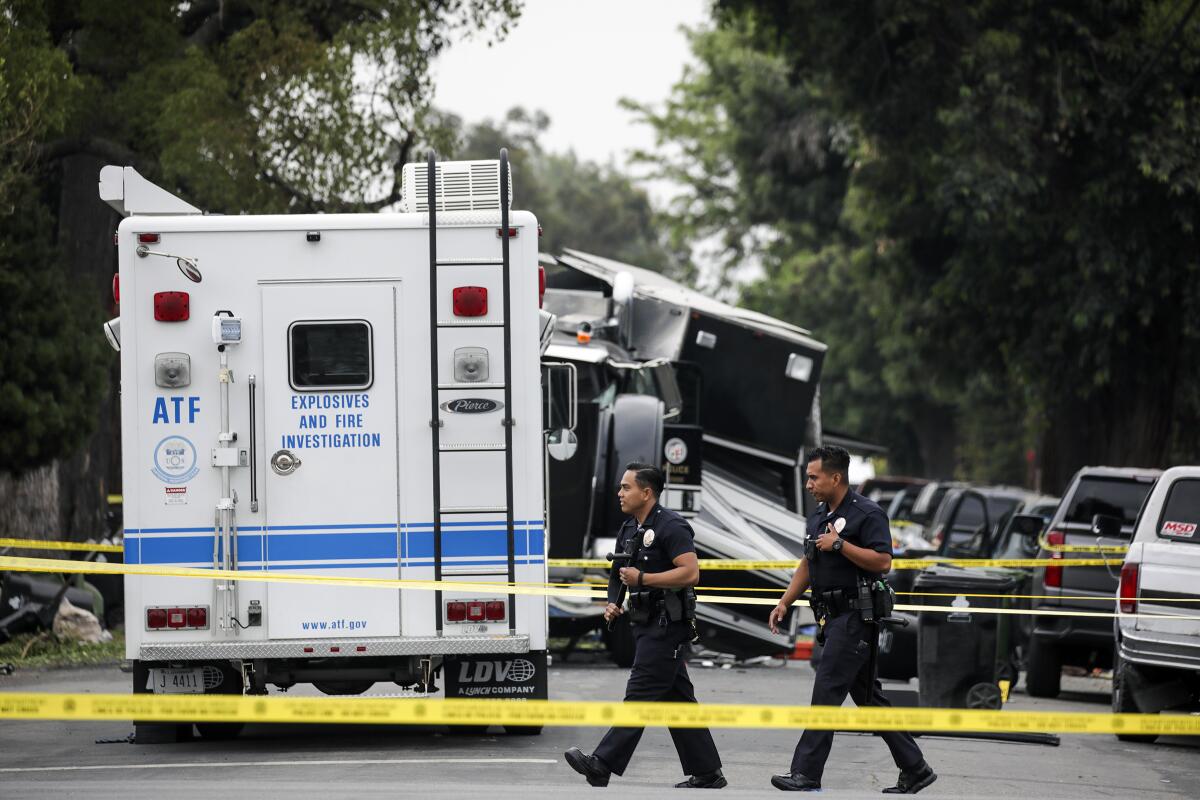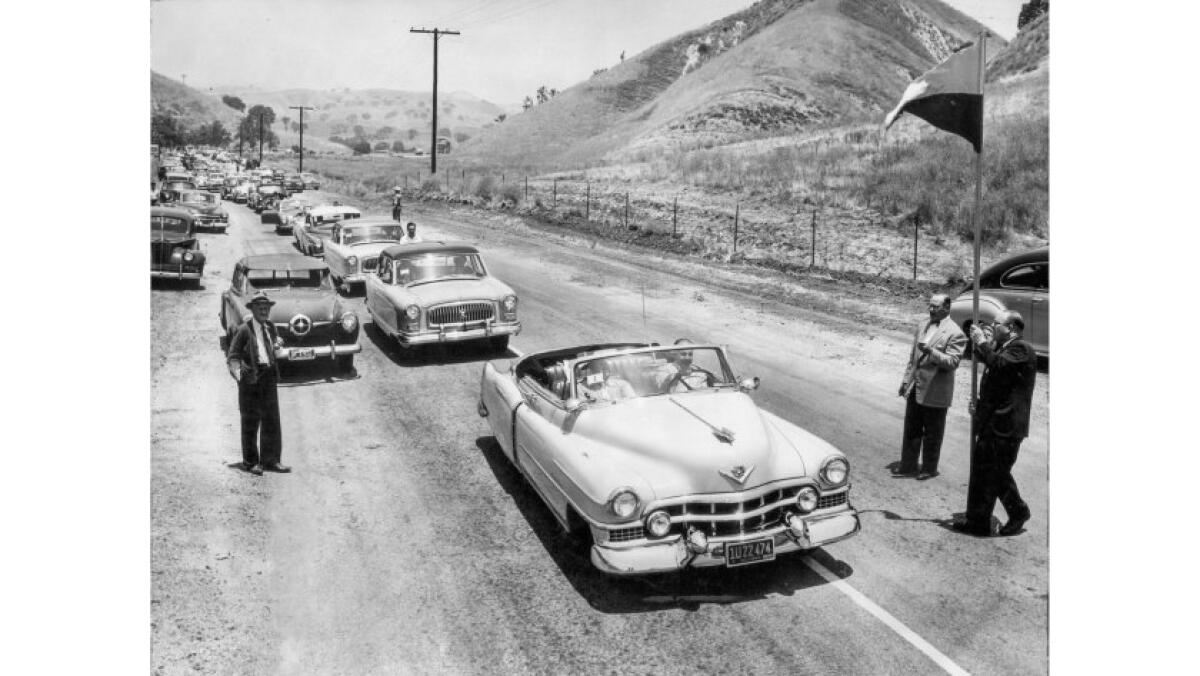Today’s Headlines: How did an LAPD fireworks seizure go wrong?

- Share via
Here are the stories you shouldn’t miss today:
TOP STORIES
How did a fireworks seizure go wrong?
When Los Angeles police discovered a few thousand pounds of illegal fireworks in a South L.A. yard Wednesday morning, some of the explosives were particularly troubling to members of the bomb squad.
The department’s explosives experts were content to haul off nearly all of the illegal stash to a secured location for destruction. It was a run-of-the-mill operation in the lead-up to the Fourth of July in a city obsessed with the danger of fireworks.
But about 40 soda-can-sized items and 200 smaller items, each with a short fuse and unknown firepower, gave them pause. They were uncertain the devices were stable enough to transport.
Instead, they tried to safely detonate the devices in a specialized container right there on the street — and caused a massive explosion that left the residential block in tatters and 17 people injured. It was a disaster captured by television choppers and crews on the ground who’d gathered in the South L.A. neighborhood to record the seizure and detonation of the fireworks.
Start your day right
Sign up for Essential California for the L.A. Times biggest news, features and recommendations in your inbox six days a week.
You may occasionally receive promotional content from the Los Angeles Times.
In the coming days, officials and experts said the U.S. Bureau of Alcohol, Tobacco, Firearms and Explosives and other investigators will work swiftly on multiple fronts to determine the exact composition of the devices. As well as track down their origin, interview whoever made them, and find out if similar devices are in other communities.
They will also consider whether the LAPD’s efforts to clear the area — they said they knocked on doors on the block to get people to leave — were adequate in the face of such unknown explosive power.
A new plan to restrict homeless camping
Los Angeles City Council members have approved a new package of restrictions on encampments near homeless shelters, day-care centers and an array of other public facilities.
Council members voted 13 to 2 to enact rules regulating sitting, sleeping and storing property near fire hydrants, building entrances, driveways, libraries, parks, elementary schools and several other locations.
Backers of the ordinance said it would compassionately restore access to public spaces, treating most violations as infractions that can result in fines, not jail time, and limiting law enforcement involvement. They warned that their constituents would not continue to support new shelters and or other homeless facilities unless the city shows they have regained control of the sidewalks and other public spaces.
The mechanics of the new ordinance have raised alarms both among advocates for the unhoused and from those who want a more rapid removal of encampments. Some argue the measure would further criminalize homelessness, and others saying the city took too long to act.
The anti-camping ordinance cannot go into effect until after council members cast a second vote, which is expected to occur at the end of the month.
Trump Organization charged with tax fraud
The Trump Organization, an international showcase for gaudy wealth that made Donald Trump a household name long before he ran for president, has been dodging taxes for years, according to Manhattan prosecutors who unveiled the first criminal charges against the company on Thursday.
The organization is charged with criminal tax fraud and scheming to defraud the government. Allen Weisselberg, Trump’s longtime accountant and keeper of his financial secrets, faces the same charges plus grand larceny and falsifying records, according to the 15-count indictment.
The indictment did not name Trump or any of his relatives, but it could prove debilitating for their company if it becomes harder to find business partners or obtain bank loans. Trump called the prosecution a continuation of a “witch hunt” he claims to have faced for years, and his lawyers criticized the charges as politically motivated.
The indictment’s effect on Trump’s political stature is uncertain. It will probably provide more ammunition to the minority of Republican leaders who have grown weary of Trump’s influence on the party.
Newsom recall vote set for September
Lt. Gov. Eleni Kounalakis has set Sept. 14 as the date for the recall election targeting California Gov. Gavin Newsom, leaving it up to voters to decide whether to oust a sitting governor for just the second time in the state’s history.
The tight election timetable gives prospective candidates just over two weeks to decide whether to jump into an expected frenzied race to potentially replace Newsom. However, a cadre of notable Republicans launched unofficial campaigns months ago with promises of loosening the Democrats’ ironclad grip on California’s state government.
Regardless of the odds, the recall election is expected to attract a considerable amount of money.
The state Department of Finance released an updated estimate of the special election cost: $276 million. The vast majority of that falling on county election agencies must shoulder the cost of printing ballots, setting up voting sites and processing votes. The state already has set aside $250.2 million to fund the recall election.
More politics
— The Supreme Court’s conservative majority limited the reach of the Voting Rights Act and ruled that states may enforce election rules even if they have a more discriminatory impact on Black, Latino or Native American voters.
— The House has approved an approximately $715-billion transportation infrastructure plan that would build and repair roads, bridges and rail systems around the country — including $920 million specifically targeted to projects throughout California.
— House Speaker Nancy Pelosi has included three fellow Californian Democrats — and a Republican, Rep. Liz Cheney — among her eight choices of members to serve on the House select committee to investigate the Jan. 6 attack on the U.S. Capitol. House Minority Leader Kevin McCarthy (R-Bakersfield) is allowed to name five members to the panel, though he hasn’t yet.
For more news and analysis, sign up for our Essential Politics newsletter, sent to your inbox three days a week.
'The Times' podcast
Our new weekday podcast, hosted by columnist Gustavo Arellano, takes listeners beyond the headlines. Subscribe on Apple Podcasts and follow on Spotify.
FROM THE ARCHIVES
In 1952, a new highway, Malibu Canyon Road, welcomed drivers.
A story accompanying this image in the July 3, 1952, Los Angeles Times reported:
“Nature’s barrier between the San Fernando Valley and the Pacific Ocean, the Santa Monica Mountains, was breached anew yesterday as official ceremonies marked the opening of a new highway from Brent’s Junction to Malibu.
“Brent’s Junction is on Ventura Blvd., about five miles west of Topanga Canyon Blvd.
“The two-lane, gently curving road cuts through a 535-foot solid-rock mountain to enable motorists to travel the 9.4-mile road safely in 18 minutes. The same trip previously took upward of an hour, according to officials.”

YOUR WEEKEND
— This Fourth of July weekend is the first major holiday Californians can gather and celebrate in large groups since the state reopened. Here’s where to go.
— Fleeing fireworks? Here are 10 ways to a peaceful holiday weekend in Southern California.
— The 21 best things to do on Catalina include trails and toes-in-the-sand dining.
— The newest, coolest L.A. and O.C. museum shows you should check out this month.
Editor’s note: This newsletter will be off Monday and Tuesday. We’ll be back in your inbox on Wednesday.
CALIFORNIA
— Three fires raging in Northern California have been spurred by bone-dry vegetation, gusty winds and a record-setting heat wave that continues to grip the region. As the lightning-sparked Lava fire blazes in Siskiyou County, near the Oregon border, a pair of fires — one to the north and one to the south — expanded, forcing evacuations and road closures as more firefighters joined the fray.
— State authorities approved an audit of the Metropolitan Water District of Southern California over its handling of sexual harassment complaints, after allegations that leaders at the powerful water agency tolerated bullying and abuse.
— Amid economic and political turmoil during the COVID-19 pandemic, California saw a record increase in the sale of handguns last year, and the number of long-gun purchases was higher than it has been in four years, according to state Atty. Gen. Rob Bonta.
— The story of José Tomás Mejía’s escape from war in El Salvador and the success he found in Los Angeles was legendary in his hometown. No one expected Mejía’s story to end on the fifth floor of the apartment complex where he worked.
THE CORONAVIRUS
— The highly contagious Delta variant of the coronavirus is continuing to circulate in California, further highlighting the importance of getting vaccinated as the state and nation gear up to celebrate the Fourth of July, officials say.
— The African Union special envoy leading efforts to procure COVID vaccines for the continent is blasting Europe as Africa struggles amid a third wave of infections.
— Russian health authorities have launched booster COVID vaccinations for those immunized more than six months ago.
Support our journalism
Subscribe to the Los Angeles Times.
NATION-WORLD
— Why was Bill Cosby set free? His release has brought anger and alarm to the #MeToo movement, though legal experts say it was based on an uncommon technicality.
— The Justice Department is halting federal executions after a historic use of capital punishment by the Trump administration, which carried out 13 executions in six months.
— After nearly 20 years, the U.S. military left Bagram Airfield, the epicenter of its war to oust the Taliban and hunt down the Al Qaeda perpetrators of the 9/11 terrorist attacks on America, two U.S. officials said Friday.
— As China’s Communist Party turns 100, President Xi Jinping is trying to rally his compatriots and warn his critics with a mass display of triumphant nationalism.
— With Israel’s naval blockade of Gaza restricting fishing to a zone of six miles from the coastline, Gazan fishermen work long hours for meager returns.

HOLLYWOOD AND THE ARTS
— The latest Verzuz battle is bringing the heat with R&B powerhouses Bobby Brown and Keith Sweat going head to head as part of Essence magazine’s virtual Festival of Culture.
— After consecutive years of controversy about its rule limitations, the Hollywood Foreign Press Assn. will now allow non-English-language movies to compete for the best picture prizes in the Golden Globes.
— Like any heist — or any heist movie — Steven Soderbergh’s “No Sudden Move” starts with a simple plan. You’ll have to play close attention from there.
— Meghan McCain, the lone conservative voice on ABC’s daily talk show “The View,” told viewers that she will leave the show this month.
BUSINESS
— The psychics of TikTok, Cameo and Clubhouse are seeing — and making — fortunes as mystical traditions move online as the pandemic eases.
— The Standard & Poor’s 500 index rose 0.5%, marking its sixth straight gain and fourth consecutive record high.
SPORTS
— Californians from L.A. to the Bay are the reason that America’s college athletes are getting paid for their fame today. Here’s how they did it, the lessons that shaped them and reflections on the journey.
— The Dodgers will be the first professional sports team to visit the White House since the start of the pandemic. President Biden will host the 2020 World Series champions today.
Free online games
Get our free daily crossword puzzle, sudoku, word search and arcade games in our new game center at latimes.com/games.
OPINION
— Asian people in Arcadia against homeless people? It’s complicated, writes Jireh Deng.
— Telling homeless people where they cannot camp will not stop them from being homeless, The Times’ editorial board writes.
WHAT OUR EDITORS ARE READING
— Pride Month is over. Here’s how to be an ally to the LGBTQ+ community the rest of the year. (USA Today)
— Animation’s queer women, trans and nonbinary creatives are pushing gender boundaries in kids’ cartoons their counterparts couldn’t — or wouldn’t dare. (Insider)
ONLY IN CALIFORNIA
As California’s legal recreational cannabis market matures and delivery services make it less necessary to venture into a brick-and-mortar dispensary, making the pot-shop experience memorable is more important than ever. Here are the 10 best SoCal pot shops worth seeing in person right now.
Today’s newsletter was curated by Daric L. Cottingham and Laura Blasey. Comments or ideas? Email us at headlines@latimes.com.
Sign up for Essential California
The most important California stories and recommendations in your inbox every morning.
You may occasionally receive promotional content from the Los Angeles Times.






